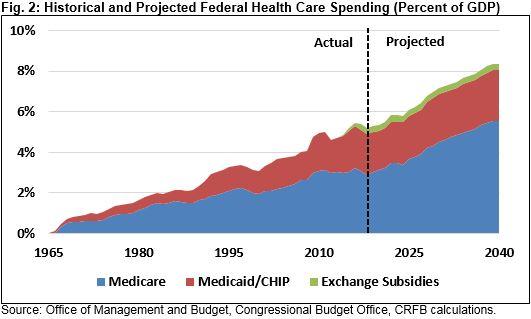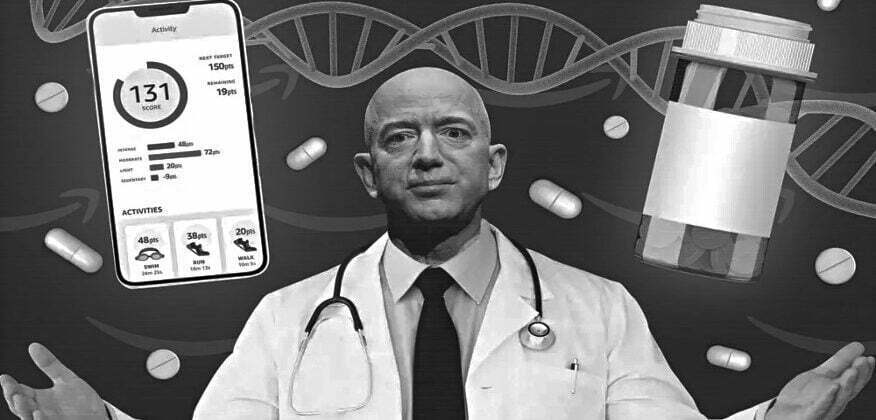With health care accounting for nearly 20% of U.S. gross domestic product, Amazon’s latest acquisition of a primary care chain seems to make sense.
Amazon plans to buy the primary care organization One Medical in a nearly $4 billion deal, adding to the growing list of the tech giant’s acquisitions and attempts to expand its reach in the health care industry. According to Neil Lindsay, senior vice president of Amazon Health Services, “We think health care is high on the list of experiences that need reinvention.”
It’s not just the private sector that sees steady growth in the health care industry. As the population ages and per-capita health care costs rise, nearly all forecasters expect federal health care spending to continue to grow.
Based on Congressional Budget Office (CBO) projections, major federal health spending will rise from 5.4 percent of GDP in 2017 to 6.8 percent in 2028 and 8.4 percent by 2040.

This is not Amazon’s first foray into health care. Amazon acquired the online pharmacy company PillPack for $753 million in 2018 and launched Amazon Pharmacy in 2020 as a prescription and delivery service. The company isn’t new to telehealth either. Amazon Care, a 24-7 texting and video service app for people to connect with clinicians, began in 2019 with Amazon employees.
It formed into a nationwide program earlier this year. As one would imagine, Amazon has amassed a plethora of data that includes health information from hospitals and other health systems. The company is utilizing artificial intelligence to train this data to understand and extract health data from medical texts, such as prescriptions, procedures, or diagnoses. In addition to these Amazon Web Services (AWS), the company has invested significant resources in the development of Halo Band, an intuitive wearable that tracks health metrics.
This has provided Amazon an easy and logical entry point into the booming personal health and fitness space.
It’s all about transforming the patient experience and the way care is delivered. How might this patient-centric scenario play out in the future? Imagine if personal health data could be combined with shopping patterns to identify an individual as at risk for an illness and preventive measures could be sent via text message.
If the condition worsened and the individual needed to see a doctor, an appointment could be scheduled via a virtual personal assistant, and the doctor could order a prescription using voice commands, and two hours later the medication could be delivered to the patient’s door. Pretty snazzy! Of mutual benefit would be that Amazon could offer healthcare at a lower cost and at a time and place that patients prefer.
Amazon will surely attempt to disrupt the pharmacy and prescriptions business. Currently, the company is selling prescriptions in Japan and distributing medical supplies in the U.S. If Amazon can comply with U.S. pharmaceutical regulations, including specialized supply chain rules for controlled substances, and navigate healthcare’s complex payment model, it could change the industry.
Amazon could make it easier for physicians to order prescriptions and allow patients to fill prescriptions at a convenient time and place.
However, as in life, nothing worthwhile is easy. According to Dr. Matthew Sakumoto, a clinician and digital health expert based in San Francisco, “There’s potential, but it will be difficult to integrate across Amazon’s wide swath of health care services.”
While difficult, it is ultimately possible. Another potential hurdle involves the privacy of medical information. Privacy advocates have raised concerns about how Amazon’s newest acquisition can leave one’s retail purchases, groceries and streaming content under the same umbrella as their health care.
Dr. Sakumoto goes on to say, “I think it opens a lot of interesting questions as to kind of where are the ethics and the legal pieces of that moving forward. But so far, the health privacy laws, I think, will provide a pretty good firewall for now.”
As we’ve seen before, Amazon plays the long game. With a history of taking on risk, and a large volume of cash on hand to do so, building in-house capabilities to navigate regulatory barriers is probably not far off in the horizon.
If Amazon can respond to customers’ needs and improve the quality of care, its entrance into the healthcare space could create an entirely different healthcare experience.
Incumbents in the healthcare industry can’t afford to ignore the implications of Amazon’s entry into their marketplace. Time will tell how the tech giant will change the face of the industry for generations to come.











